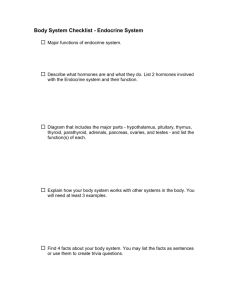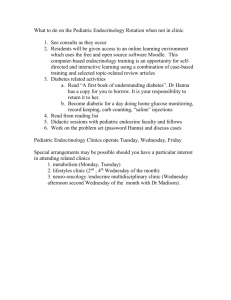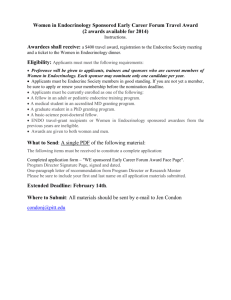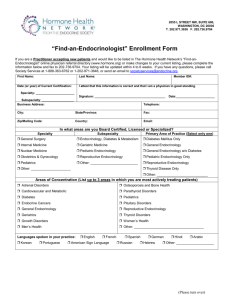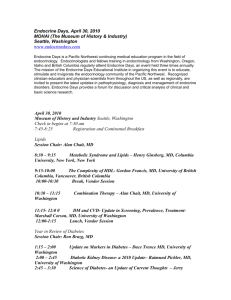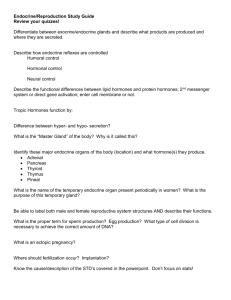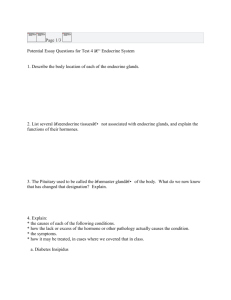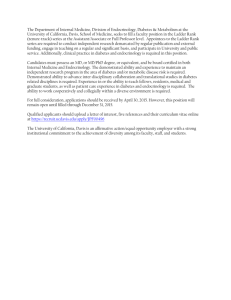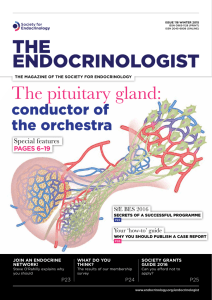TOURO COLLEGE COURSE SYLLABUS
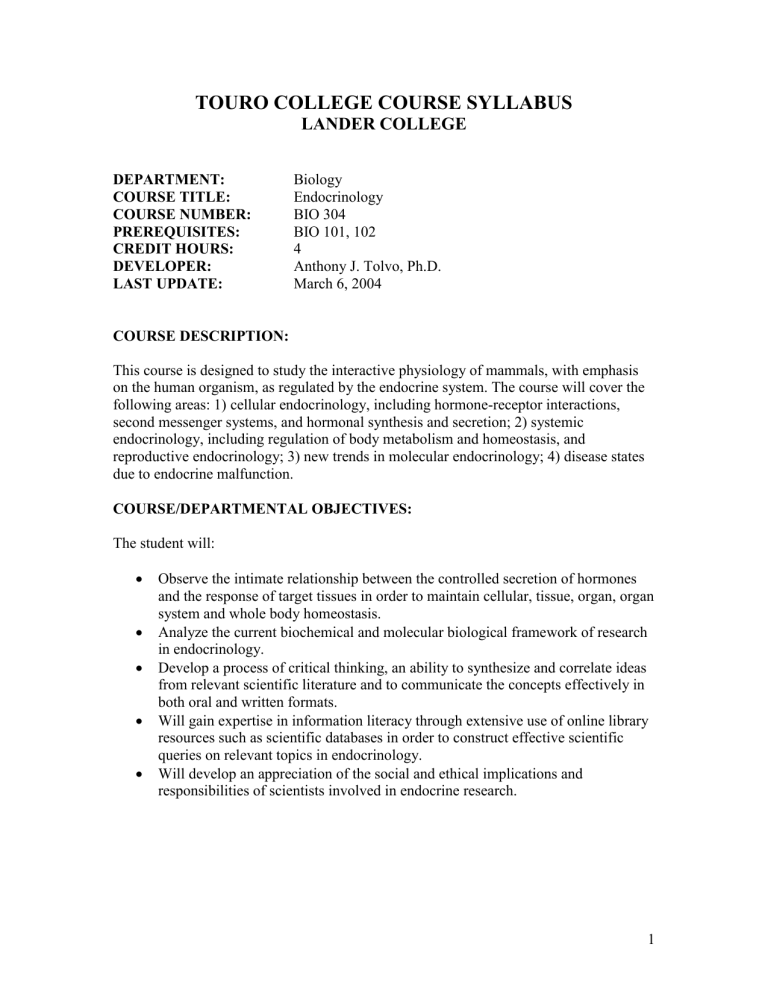
TOURO COLLEGE COURSE SYLLABUS
LANDER COLLEGE
DEPARTMENT:
COURSE TITLE:
COURSE NUMBER:
Biology
Endocrinology
BIO 304
PREREQUISITES:
CREDIT HOURS:
DEVELOPER:
LAST UPDATE:
COURSE DESCRIPTION:
BIO 101, 102
4
Anthony J. Tolvo, Ph.D.
March 6, 2004
This course is designed to study the interactive physiology of mammals, with emphasis on the human organism, as regulated by the endocrine system. The course will cover the following areas: 1) cellular endocrinology, including hormone-receptor interactions, second messenger systems, and hormonal synthesis and secretion; 2) systemic endocrinology, including regulation of body metabolism and homeostasis, and reproductive endocrinology; 3) new trends in molecular endocrinology; 4) disease states due to endocrine malfunction.
COURSE/DEPARTMENTAL OBJECTIVES:
The student will:
Observe the intimate relationship between the controlled secretion of hormones and the response of target tissues in order to maintain cellular, tissue, organ, organ system and whole body homeostasis.
Analyze the current biochemical and molecular biological framework of research in endocrinology.
Develop a process of critical thinking, an ability to synthesize and correlate ideas from relevant scientific literature and to communicate the concepts effectively in both oral and written formats.
Will gain expertise in information literacy through extensive use of online library resources such as scientific databases in order to construct effective scientific queries on relevant topics in endocrinology.
Will develop an appreciation of the social and ethical implications and responsibilities of scientists involved in endocrine research.
1
COURSE/INSTITUTIONAL OBJECTIVES:
This course is designed to provide students with a strong conceptual background in the biological and biochemical aspects of endocrine regulation. It provides a valuable area of scientific inquiry for those interested in pursuing graduate work in biology and medicine. Commensurate with this objective, the course is designed to fulfill the following institutional goals:
Foster and appreciation of scholarship and enhance research skills in the field of endocrinology.
Further pre-professional career interests of students interested in biology and associated clinical fields.
Enhance a global perspective with regard to modern biological experimentation and research.
COURSE CONTENT:
Cellular Endocrinology:
Autocrine, paracrine and endocrine regulation
Signal transduction and signal transduction pathways
Membrane receptor systems and cytoplasmic receptor systems
Synthesis and secretion of hormones
Post-transcriptional and post-translational processing of hormones
The Pituitary Gland:
Interrelationships between the central nervous system and the endocrine system
Embryological origins of the pituitary gland
Anatomical and physiological aspects of the anterior and posterior pituitary
Concepts of positive and negative feedback in hormone regulation
Neuroendocrine regulatory pathways
Peripheral Endocrine Glands/Tissues:
Thyroid gland
Adrenal hormones
Gonadal hormones
Secretions of the pancreas
The kidney as an endocrine organ
The heart as an endocrine organ
Regulation of calcium homeostasis
Interrelationships between peripheral endocrine tissues: the rennin-angiotensin system
2
Endocrine Disease:
The basis of endocrine disease states
Gigantism and dwarfism
Thyroid disease states
Diabetes
Adrenal disease states
Post-menopausal and senile osteoporosis
HARDWARE/SOFTWARE/MATERIALS REQUIREMENTS:
Hardware/software:
Not applicable
Instructor materials:
Instructor desk copies of text(s) and appropriate ancillaries
Office PC for course-related word processing, spreadsheet, presentation tasks
Overhead projector
PC projection equipment
TV/VHS equipment
COURSE REQUIREMENTS:
Two sectional lecture exams
Semi-cumulative final lecture exam
Weekly lecture quizzes
Three sectional laboratory exams
Completion of laboratory “portfolio”
Attendance and participation
GRADING GUIDELINES:
Two sectional lecture exams……………………………………………..30%
Semi-cumulative final exam……………………………………………...20%
Term paper…………………………………………………………….….10%
Special Assignment (analysis of original research paper(s)……………...10%
Laboratory………………………………………………………………...30% o Three laboratory exams……………………..75% o Portfolio……………………………………..25%
3
METHODOLOGY:
Lectures and laboratories should be enhanced using the following teaching tools:
Texts and appropriate primary and secondary sources from the scientific literature
Visual models and charts
Overhead transparencies and Powerpoint presentation materials
Relevant internet sites and searches
VHS videos on endocrinology and related topics
COURSE TEXTS:
Title: Basic and clinical endocrinology
Author: Greenspan, F., Gardner, D. (ed.)
Pub. Date: 2003
Publisher: Appleton and Lange (Prentice-Hall)
ISBN #: 0071402977
BIBLIOGRAPHY:
Title:
Author:
William’s textbook of endocrinology
Williams, R.H., et al., (eds.)
Pub. Date: 2002
Publisher: W.B. Saunders
ISBN #: 0721691846
Title:
Author:
Endocrinology at a glance
Greenstein, B.J.
Pub. Date: 1994
Publisher: Blackwell Science, Inc.
ISBN #: 0632038357
Title: Principles and practice of Endocrinology and metabolism
Author: Becker, K.L. (ed.)
Pub. Date: 2002
Publisher: Lippincott, Williams and Wilkins
ISBN #: 0781742455
4
